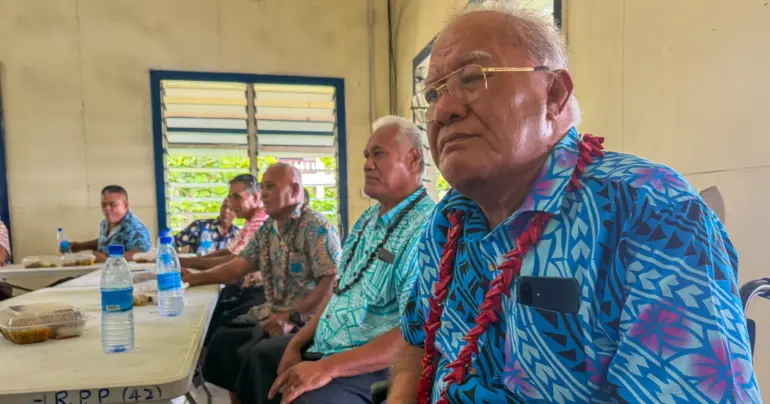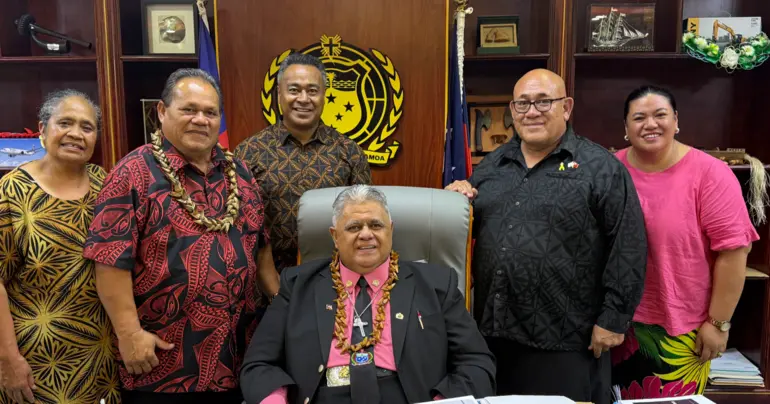Sex Offenders Registry signed into law
The Sex Offenders Registration Act 2017 has been signed into law by the Head of State, His Highness Tuimaleali’ifano, Va’aletoa Sualauvi II.
This was confirmed by Ministry of Prime Minister and Cabinet Assistant Chief Executive Officer, Siaopo Pese.
“It’s already signed into law,” he said. Asked to elaborate, he declined.
But the decision is a step in the right direction for Samoa’s fight against repeated sex offenders.
The Sex Offenders Registration Act 2017, was initiated by Supreme Court Justice Vui Clarence Nelson, about five years ago when he appealed to the government to establish a Sex Offenders Registry.
Speaking to the Samoa Observer from Geneva, Justice Vui says this Act is about keeping the women and children of Samoa safe.
“This is an essential piece of legislation necessary for the protection of women and the children of our country,” he said.
“Also in relation to the dangers posed by convicted sex offenders being deported back to Samoa from overseas.”
Justice Vui commended the government’s Law Reform Commission who led extensive public consultations.
“The L.R.C. spent a long time refining and redefining the legislation to suit Samoa’s needs.”
Justice Vui also complimented the Office of the Ombudsman and other organisations who strongly supported the legislation.
“The credit should go to the Attorney General’s office, particularly the former A.G., Aumua Ming Lueng Wai, who picked up on my comments and ran with it.
“The challenge now lies in its implementation by the Samoa Police Service.
“I hope they assign it the importance it deserves,” said Justice Vui.
The Act was approved by the Legislature just before the holidays last month.
The Sex Offenders Act provides the registration of sex offenders and to prescribe requirements and controls applicable to registered sex offenders.
“This Act commences on the date of assent of the Head of State.”
The purposes of this Act require certain offenders who commit sexual offences to keep the police informed of their whereabouts and of other personal details for a period of time so as to reduce the likelihood that they will reoffend, and to facilitate the investigation and prosecution of any future offences that they may commit and any additional purposes.
The Act requires the establishment of a register of sex offenders 2017, and it requires certain offenders who are sentenced for registrable offences to provide specified personal details for inclusion in the register, and to keep the required details up to date.
Also this Act enables the court to order offenders who commit registrable offences to comply with the reporting obligations of the Act.
The Act also allows for the recognition of reporting obligations imposed under laws of foreign jurisdictions.
This Act applies to registered offenders in Samoa and sex offenders who enter Samoa.
The sex offender registration orders that if a court convicts a child of a registrable offence and regards the child as being at a high risk of sexual offending, it may order the child to be deemed to be a registrable offender if, after taking into account any matter that it considers appropriate, it is satisfied, beyond reasonable doubt, that the child poses a risk to the sexual safety of one or more persons or of the community.
The Act also indicates the Police Commissioner may make application to a court for a person in Samoa to be deemed to be a registrable offender under this Act if the person was convicted of an offence outside.
Under this Act, the initial report of a registrable offender in government custody in Samoa as a consequence of a registrable offence is seven days before he or she ceases to be in government custody.
A person who is convicted of an offence before the commencement of this Act and such offence is a registrable offence under this Act and who is in government custody in Samoa for that offence.
A registrable offender must provide information in relation to all matters specified in the form, which may require details of the offender's identity, including date and place of birth, passport details, any names by which the offender has ever been known, and details of tattoos or distinguishing marks or features; places at which the offender generally resides, contact details, including telephone numbers, email addresses, internet service providers, details of any children with whom the offender has contact, and details of where, when and how such contact occurs, employment details, including places where the offender is generally employed; details of previous convictions and of terms spent in government custody, details of motor vehicles owned or used by the offender; details of clubs or associations of which the offender is a member and any other details required by the Police Commissioner to achieve the purposes of this Act.
The sex offender must also report to the Police Commissioner any change in his or her personal details within seven days, after that change occurs and intended absence from Samoa to be reported if the registrable offender intends to leave Samoa to travel overseas.
It is an offence if a sex offender does comply with reporting obligations, if convicted the fine will not exceed 100 penalty units or a term of imprisonment for up to five years, or both.
The Police Commissioner is responsible for establishing and maintaining the Register of Sex Offenders, and has all necessary authority in relation to matters associated with the establishment and management of the Register.
The Act states the Register and the Police Commissioner must develop guidelines in relation to the accessing and disclosure of personal information in the Sex Offenders Registration.
“Register that ensures that access to the personal information in the Register is restricted to the greatest extent that is possible without interfering with the purpose of this Act.
“Persons with access to register not to disclose personal information from it,” says the Act.
The Police Commissioner or a person authorised to have access to the Register or any part of the Register may disclose information in the Register to a government department, public statutory authority, foreign law enforcement or supervisory authority or court for the purpose of law enforcement or judicial functions or activities or as authorised or required by or under any Act or law.
The Act indicates that the Ombudsman will monitor compliance.
“The Ombudsman has authority to monitor compliance with this Part by the Police Commissioner and other persons authorised by the Police Commissioner to have access to the Register or any part of the Register.”
The Act further prohibits sex offenders from child-related employment, such as child protection, child care and other support services for children such as education, counselling services, coaching or private tuition services for children, paediatric wards of hospitals; clubs or associations directed at children or whose membership comprises children; providing, on a commercial or voluntary basis, a transport service specifically for children; providing, on a commercial basis and not merely incidentally to or in support of other business activities services specifically for children.











